Casual Racism Still Plagues Post-Soviet Countries
Idris Diaz, Muslim Reporter, Later U.S. Envoy, Dies
Short Takes: “Passionate” Hmong journalists, Connie Chung, Greg Stanford, William Monroe Trotter
Support Journal-isms
Casual Racism Still Plagues Post-Soviet Countries
“In an exclusive interview with The Daily Beast, famed Ukrainian television presenter and producer Karolina Ashion shared what she describes as the most painful moment of her career: when her former boss — then the director of Ukraine’s 1+1 media conglomerate and current Minister of Culture Alexander Tkachenko — allegedly told her that her appearance on a popular morning show would hurt the network’s ratings,” Anna Nemtsova wrote Friday, updated Sunday, for the Daily Beast.
“Ashion is a Black Ukrainian. Her father came to Leningrad, USSR, from Nigeria to study engineering. Even now, six years after the incident took place, Ashion is emotional talking about it, and struggles to find the words to describe her manager’s behavior.
“The presenter said the conversation with her then-boss began when she asked him why nobody would invite her to take part in the morning show’s broadcasts. She was working as an on-air talent at two weekly television shows at the time, but had a long-time dream to be featured in the major lifestyle program Snidanok z 1+1, the Ukrainian equivalent of Good Morning America.
“ ‘I remember Tkachenko telling me: “Have you seen yourself in the mirror? Our channel’s audience is not really… I am not ready to risk our ratings,” ‘ Ashion told The Daily Beast. After coming home the day of the encounter, Ashion told her husband about the conversation with her boss. ‘I cried in the kitchen and made the decision to quit my job,’ she told The Daily Beast. ‘Obviously it was impossible to stay.’

“But Ashion’s career did not freeze. She was offered positions with other television channels and primetime shows, and her popularity flourished. If not for a more recent incident, Ashion might have swallowed the pain in silence, as many people of color often do in post-Soviet countries and across Eastern Europe. But on June 26, the presenter said she ran into the minister and his wife in the city of Lviv, after attending a Chris Botti jazz concert.
“Instead of solving this problem easily by just shaking my hand and giving some friendly ‘Forgive me,’ minister Tkachenko said with a smirk: ‘What do you want from me now? An apology?’ Ashion claimed. ‘His comments sent me back to the six-year-old incident. The minister demonstrated his confidence. He felt right back then, and he has no shadow of doubt he is right now’ . . .”
Nemtsova also wrote, “Tkachenko refused to apologize and declined to address the issue, even as it became widely discussed in Ukraine. And then, this week, another racism scandal erupted when a Black Ukrainian, comedian Victor Vemun, spoke out [about] being invited to an openly racist show, Taras the Papuan, which has mocked Black people as ‘whites who’ve been burned over the fire.’
“Vemun and his sister rejected the offer. ‘For as long as they say from our country’s most popular stages that the color of our skin is just burnt white skin, Ukrainian parents will tell their kids, that we, black people, are black because we are burnt, smoked humans,’ Vemun said in his Instagram post captioned, ‘We plummet to new depths.’
“Casual racism has long plagued post-Soviet countries. ‘For a long, long time I’d [only] get invited to castings for porn star or Cuban stripper roles,’ Moscow movie actor Jean-Michel told The Daily Beast. ‘It is important to speak about this issue. I often notice that on seeing a Black guy… or a girl with big Afro hair, people can’t even fathom that the person was actually born in Russia.’. . .”
The “casual racism” has gone beyond insults and casting stereotypes. A Black American diplomat, not assigned to Ukraine, was attacked in Kiev in 2005 by a group of men in an apparent hate crime. The diplomat sustained minor injuries.
 Journal-isms asked then-Secretary of State Condoleezza Rice (pictured, 2019, by Michigan Daily) about the incident at a State Department briefing with the National Conference of Editorial Writers, now part of the News Leaders Association.
Journal-isms asked then-Secretary of State Condoleezza Rice (pictured, 2019, by Michigan Daily) about the incident at a State Department briefing with the National Conference of Editorial Writers, now part of the News Leaders Association.
“As soon as it happened we were in touch with the Ukrainian Government,” Rice said at the April 4, 2005, session. “I’ve talked to my own counterpart about it.
“Look, it’s a very ugly incident. It is not an unknown fact about Eastern Europe, the former Soviet Union, that this kind of behavior by skinheads, particularly against people of color, has been a problem in the past. This is an area of the world I know really well both as a specialist and as a person of color, and so I’m very aware of these problems.
“And the Ukrainian Government was deeply embarrassed by it, promised and I think is conducting a full investigation. They don’t want this sort of stain on their new democracy either. They’re dealing with really bad elements that have grown up in that part of the world over a long period of time. But they are not just aware of it; I think they really are trying to do something about it.”
- Cosmos Ojukwu, Business Ukraine: INTERVIEW: Afro-Ukrainian icon and TV personality Karolina Ashion on race and revolution (July 29, 2015)
- Kyler Ong and Raffaello Pantucci, Observer Research Foundation, India: From fringe to mainstream: The extreme rightwing in Europe (July 1, 2020)
- Liana Satenstein, Vogue: How Newscaster Karolina Ashion Is Shaking Up Kiev in Style (Nov. 17, 2016)
- Ukrainian Helsinki Human Rights Union: 184 crimes and only 4 convictions: what’s behind the hate crimes statistics in Ukraine (April 25, 2020)
Idris Diaz, Muslim Reporter, Later U.S. Envoy, Dies
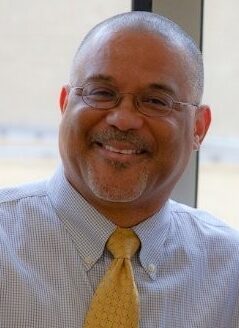 Idris M. Diaz, perhaps the first Muslim to write about taking part in the annual hajj to Mecca for a mainstream American newspaper, and who then went on to become a lawyer and State Department envoy, died July 22 of a rare stream of leukemia, his brother, Francisco Diaz, told Journal-isms Saturday. He was 61 and lived in the District of Columbia suburb of Bethesda, Md.
Idris M. Diaz, perhaps the first Muslim to write about taking part in the annual hajj to Mecca for a mainstream American newspaper, and who then went on to become a lawyer and State Department envoy, died July 22 of a rare stream of leukemia, his brother, Francisco Diaz, told Journal-isms Saturday. He was 61 and lived in the District of Columbia suburb of Bethesda, Md.
Diaz, a New York native and the son of a Black Honduran father and a mother from New Orleans, earned a master’s degree in journalism at Columbia University in 1983, then spent three and a half years at the Courier Journal in Louisville, Ky., and five at the Philadelphia Inquirer.
In his 1994 book, “American Jihad: Islam After Malcolm X” [PDF], Steven Barboza wrote that Diaz, who converted to Islam after having been raised Catholic, “found himself the sole representative of his faith wherever he has worked.
“As the staff expert, reporters and editors alike would call his home at all hours to ask for advice when covering news about Islam. The experience enlightened him about the media’s shortcomings in treating Islam knowledgeably and fairly.
“ ‘I think there’s just not the sensitivity in the portrayal of Muslims. Look at the World Trade Center bombing [of 1993],’ he says. ‘You see a spate of stories talking about Muslims as a threat. You don’t get a picture that there’s another side to the religion.’
“Diaz himself ended up writing the piece of his lifetime: covering his own hajj experience. He painted a picture of the scope of the annual hajj event for readers by asking them to imagine the entire population of Philadelphia descending on the city of Allentown for a few weeks’ stay. Entitled ‘For the Love of Allah,’ the piece made the cover of The Philadelphia Inquirer Magazine on April 2, 1989.”
Diaz wrote, “After it was published, I got tons of letters from Muslims and from non-Muslims. I got letters from people telling me they didn’t have much of a clear sense of what the religion was about until they read that. Muslims told me they were glad that my piece was out there. And I got a couple of letters from people telling me that I should burn in hell for putting out propaganda.”
Francisco (Frank) Diaz said his younger brother decided he “just wanted to do something else.” So, according to the family obituary, Diaz “graduated with honors from Howard Law School in1994, and worked briefly in corporate law at Arent Fox in Washington, D.C. But, as he’d long been fascinated with international affairs, he soon left to work at the U.S. Department of State on a legal team tasked with resolving international crises.
“From there, he joined the U.S. Agency for International Development (USAID), where, during his 15-year-tenure he rose through the ranks, working in a variety of posts at embassies in Dakar, Senegal; Kabul, Afghanistan; [and] Islamabad, Pakistan, culminating in his role as deputy mission director in New Delhi, India.
“At the time of his retirement from USAID in 2019, Diaz worked as the agency’s assistant general counsel for Africa, responsible for ensuring the $7 billion annual budget of USAID’s Africa Bureau was implemented in accordance with all applicable laws and regulations.
“Diaz was a student of diverse philosophies and religious faiths, a master of Aikido with a second-degree black belt, and an avid yoga practitioner who’d recently become a certified yoga teacher.”
Washington Post reporter Vanessa Williams messaged Journal-isms, “I worked and was friends with Idris back in Philly. He was smart, funny and just so chill, unflappable. I agree with the description in the remembrance that he had eclectic cultural tastes in food and music; he really did lean into exploring and appreciating different tastes and sounds.”
Survivors include his partner, journalist Marilyn Milloy. A memorial service is planned, perhaps in October, Frank Diaz said.
- Attorney Talib I. Karim and Dr. Nisa Muhammad, Academy of Muslim Achievement: Remembering our brother Idris
- USAID Alumni Association: In Memoriam — Recent Tributes
Short Takes
We, as Hmong people, have been so proud of Sunisa Lee.
We’ve also had some talented Hmong journalists documenting this history. There aren’t many of us, but holy crap we’re passionate.
I’m threading a few articles here you should check out. I promise they’re worth reading.
— Chenue Her (@ChenueHer) August 1, 2021
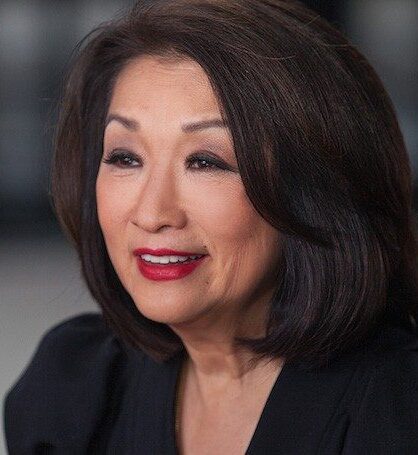 Connie Chung (pictured), the retired broadcast journalist, is among nine New Jerseyans who will have Garden State Parkway service areas bearing their names under a plan the New Jersey Turnpike Authority approved Tuesday, Colleen Wilson reported for NorthJersey.com. However, “Bruce Springsteen respectfully declined to have a service area named after him,” New Jersey Hall of Fame spokeswoman Natasha Alagarasan told Wilson. “It should be noted, though, that Bruce has been very supportive of the New Jersey Hall of Fame over the years, and is very much a part of the fabric of the Hall.” Chung’s 30-year career spanned broadcast (ABC, CBS, NBC) and cable (CNN, MSNBC). Dino Flammia, “a digital journalist for New Jersey 101.5FM,” dissented, asking, “Danny DeVito? What about Jack Nicholson? Bruce Willis? Jon Stewart? John Travolta? Meryl Streep?”
Connie Chung (pictured), the retired broadcast journalist, is among nine New Jerseyans who will have Garden State Parkway service areas bearing their names under a plan the New Jersey Turnpike Authority approved Tuesday, Colleen Wilson reported for NorthJersey.com. However, “Bruce Springsteen respectfully declined to have a service area named after him,” New Jersey Hall of Fame spokeswoman Natasha Alagarasan told Wilson. “It should be noted, though, that Bruce has been very supportive of the New Jersey Hall of Fame over the years, and is very much a part of the fabric of the Hall.” Chung’s 30-year career spanned broadcast (ABC, CBS, NBC) and cable (CNN, MSNBC). Dino Flammia, “a digital journalist for New Jersey 101.5FM,” dissented, asking, “Danny DeVito? What about Jack Nicholson? Bruce Willis? Jon Stewart? John Travolta? Meryl Streep?”
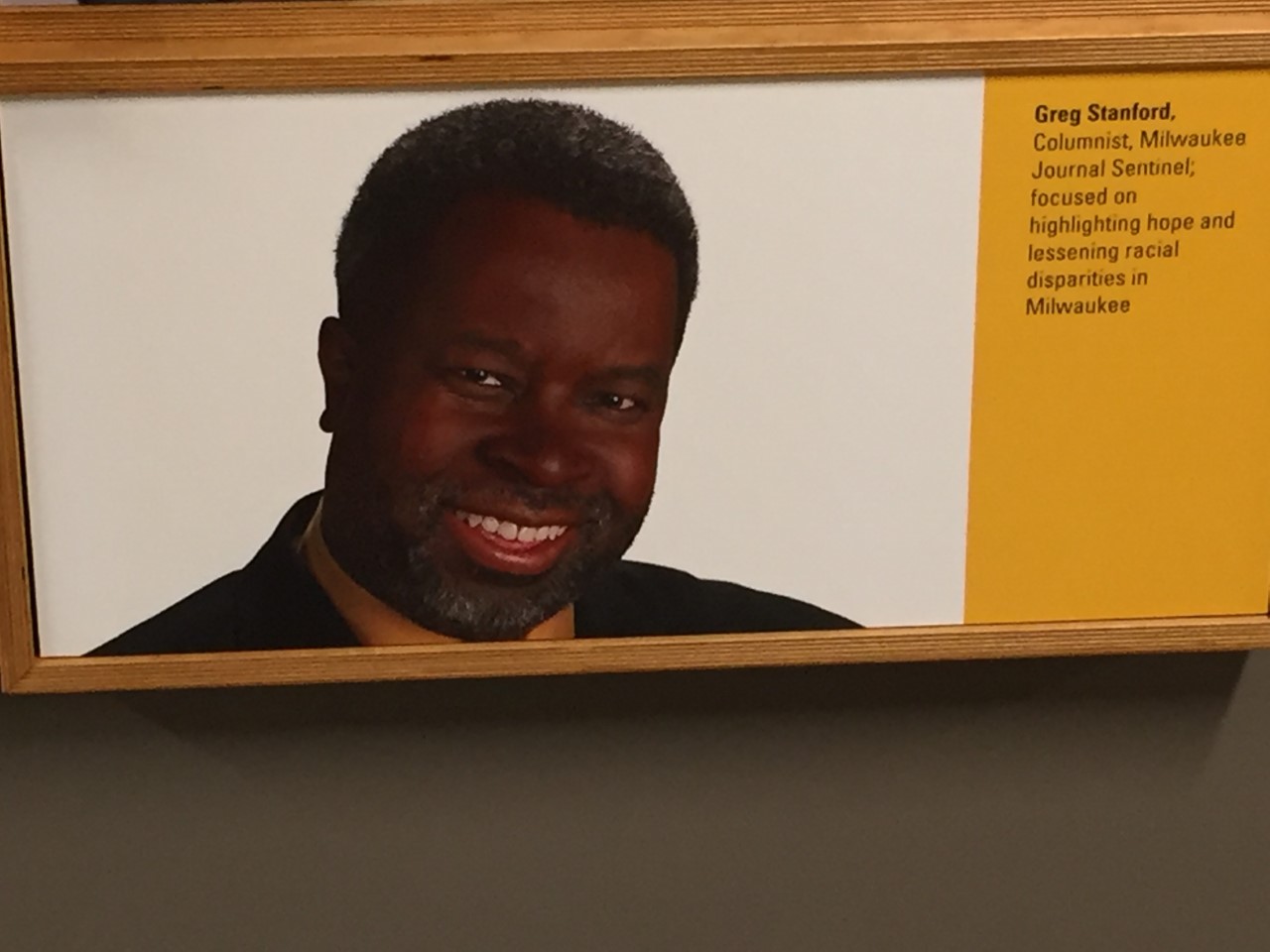 Greg Stanford, columnist for the Milwaukee Journal-Sentinel, who died in 2019, is now among notable Marquette University journalism and communication alumni pictured on the first floor of Johnston Hall at Marquette, reports Dave Umhoefer, director of the O’Brien Fellowship in Public Service Journalism at the university. Stanford was with the Milwaukee Journal and the Journal-Sentinel for 23 years, retiring in 2007 after having been an editorial writer and columnist since 1995. He maintained this website.
Greg Stanford, columnist for the Milwaukee Journal-Sentinel, who died in 2019, is now among notable Marquette University journalism and communication alumni pictured on the first floor of Johnston Hall at Marquette, reports Dave Umhoefer, director of the O’Brien Fellowship in Public Service Journalism at the university. Stanford was with the Milwaukee Journal and the Journal-Sentinel for 23 years, retiring in 2007 after having been an editorial writer and columnist since 1995. He maintained this website.
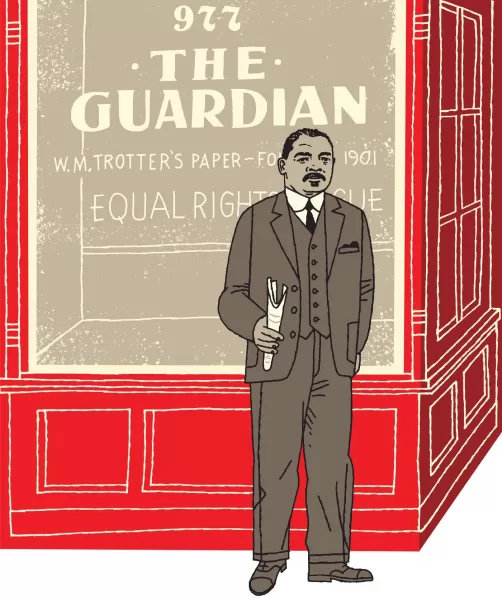
- William Monroe Trotter, the Black activist editor of the early 20th century who “rejected the view that racial equality could come in stages,” is part of a New Yorker issue on influential American news media figures.
How Much Did TV Raise Pressure on Biles?
July 30, 2021
Critic Says NBC Made Olympics the ‘Simone Games’
NPR Bends Some on Journalists Marching for Causes
Fox Hosts Leave Officer Dunn ‘Angry but Unwavered’
War on Drugs Took Uneven Racial Toll
San Antonio Station Drops Longtime Latina Anchor
Glen Ford, Journalist of the Left, Dies at 71
How Military Quashed Press Freedom in Myanmar
Short Takes
Homepage photo: Simone Biles walks off the floor after winning the silver medal in the women’s team gymnastics final. (Credit: Robert Deutsch/USA Today)
Support Journal-ismsAmerican gymnast Simone Biles withdrew from the team and individual all-around finals during the first week of the Tokyo Olympics. (Credit: Allie Caren/Washington Post)
Critic Says NBC Made Olympics the ‘Simone Games’
“As the leading promoter of the Olympics in the U.S., it is a bit rich for NBC to report on the psychological pressures” faced by champion gymnast Simone Biles “without also reflecting on the ways in which its choice to make Tokyo the Simone Games surely intensified those pressures,” Justin Peters wrote Wednesday for Slate.
“It’d be sort of like if your boss announced to an auditorium filled with your co-workers that the fate of the company was riding on your work output, and then took you aside to sympathetically observe that you looked stressed, and that the key to happiness was a healthy work-life balance.”
As Peters explained, “During the women’s team gymnastics finals that day, Biles had abruptly withdrawn from the event after landing a subpar vault, citing diminished trust in her own abilities and a desire to avoid potential injury.”
He continued, “While I cannot blame NBC for featuring Biles as its star attraction, the network ought to be able to candidly assess and admit the ramifications of its own wall-to-wall coverage. Simone Biles made herself a champion. NBC tried to make her into a superhero. The fact that she chose to reject the cape should prompt a reevaluation of the process by which it was sewn for her in the first place. . . .”
Greg Hughes, senior vice president, NBC Sports Group Communications, did not respond to a request for comment.
Tom Jones added Thursday for the Poynter Institute:
“Some of the usual professional trollers are criticizing Biles’ decision — middle-aged white guys such as conservative talk show host Clay Travis, Trump activist Charlie Kirk and Piers Morgan. Meanwhile, Fox News had on J.D. Vance, who is seeking the Republican nomination for Senate in Ohio next year, and teed him up to criticize the media for applauding Biles’ decision to prioritize her mental health. (Although, it should be noted that Fox News’ medical contributor Dr. Nicole Saphier supported Biles’ decision on ‘Outnumbered,’ as did host Harris Faulkner and panelist Dagen McDowell.)
“But, mostly, Biles seems to be getting support.
“The headline on a smart Candace Buckner column in The Washington Post: ‘For exceptional Black women like Simone Biles, greatness is never enough.’ Buckner wrote, ‘Whenever Biles pulls on her leotard, it’s as though she’s tightening a cape around her neck. She’s the hero tasked with saving a sullied sport, embodying some trite belief in American dominance — and also carrying a gender and an entire race. That’s a heavy cape, and it chokes. But it’s one that exceptional Black women, and women of color, are told to wear. Because simply being great isn’t good enough.’
“Buckner added, ‘They have to be superlative, as well as trailblazers. They have to be avatars of progress and change, and also fulfill a deeper societal responsibility as role models who break glass ceilings while breaking records. But here’s the thing: It’s okay for Biles just to be amazing. Let her greatness stand on its own. We can be wowed and celebrate her without also expecting her to single-handedly revive gymnastics after a sexual abuse scandal, while also leading little Black girls to balance beams all over the nation.”
- Associated Press: Greek TV commentator fired for remark about Korean athlete
- Lateshia Beachum, Washington Post: Black female athletes are setting records — and now leading conversations about mental health
- Vanessa Dickerson, The Undefeated: Former competitive gymnast finds her voice and makes peace with the sport
- Helene Elliott, Los Angeles Times: ‘We can all learn from her courage’: Simone Biles not alone in mental health struggle
- Kamaria Fayola, The Grio: Simone Biles and Black women athletes like her don’t owe us perfection
- Chad Finn, Boston Globe: NBC got the Simone Biles saga right by turning to Michael Phelps for his insight
- Jason Gay, Wall Street Journal: What Simone Biles Was Saying
- Hamil Harris, Zenger News: Former Olympic Gymnast Dominique Dawes Says Simone Biles Should ‘Be Able to Say No’
- Chihiro Kai, Daily Beast: Olympics Insider Calls Bullshit on Firing of Black Performer From Opening Ceremony
- Jason Lynch, Adweek: Tokyo Olympics Primetime Ratings Stumble, But NBCU Still Eyes Big Ad Revenue
- Denne Michele Norris, The Undefeated: When Black women are punished for being the best
- Robert O’Connell, The Atlantic: What Simone Biles Understands About Greatness
- Eren Orbey, The New Yorker: The Radical Courage of Simone Biles’s Exit from the Team USA Olympic Finals
- Darcel Rockett, Chicago Tribune: Simone Biles stepped back from the Olympics for her own self-care. The world should pay attention.
- Monica Torres, HuffPost: Simone Biles Refused To Be A Work Martyr. You Should, Too.

NPR Bends Some on Journalists Marching for Causes
“NPR rolled out a substantial update to its ethics policy earlier this month, expressly stating that journalists may participate in activities that advocate for ‘the freedom and dignity of human beings’ on both social media and in real life,” Kelly McBride wrote Thursday as NPR’s public editor.
“The new policy eliminates the blanket prohibition from participating in ‘marches, rallies and public events,’ as well as vague language that directed NPR journalists to avoid personally advocating for ‘controversial’ or ‘polarizing’ issues.
“NPR’s current ethics policy was first drafted in the early 2000s, and then given an overhaul in 2010-2011.
“The new NPR policy reads, ‘NPR editorial staff may express support for democratic, civic values that are core to NPR’s work, such as, but not limited to: the freedom and dignity of human beings, the rights of a free and independent press, the right to thrive in society without facing discrimination on the basis of race, ethnicity, gender, sexual identity, disability, or religion.’
“Is it OK to march in a demonstration and say, ‘Black lives matter’? What about a Pride parade? In theory, the answer today is, ‘Yes.’ But in practice, NPR journalists will have to discuss specific decisions with their bosses, who in turn will have to ask a lot of questions. . . .”
McBride also wrote, “Black, Hispanic, Asian and Native American journalists have argued that they have been disproportionately confined by — even disciplined over — policies that limit personal expression. . . .”
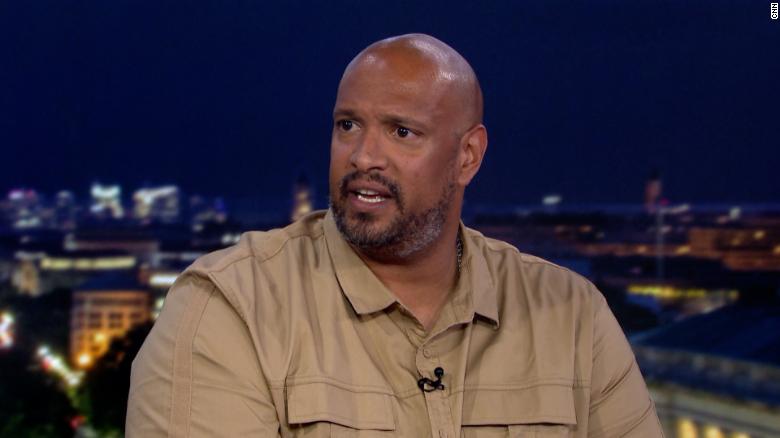
Fox Hosts Leave Officer Dunn ‘Angry but Unwavered’
“Capitol Police officer Harry Dunn joined CNN’s Don Lemon Wednesday night to talk about his testimony before the January 6th select committee and reactions from Fox News hosts,” Josh Feldman reported Wednesday for Mediaite.
“Lemon prefaced the interview by playing comments from Tucker Carlson and Laura Ingraham swiping at and mocking the testimony of the four officers, including Ingraham’s ‘best performance’ awards. She ‘awarded’ Dunn for ‘blatant use of partisan politics.’
“The CNN host said ‘that is some twisted you-know-what’ and called them both ‘cowards.’
“In the next segment, Dunn addressed that when he talked to Lemon about his testimony.
“ ‘You know what hurts more than — or just as much as — what happened on January 6th, the attacks? The attacks on our credibility and that we’re lying and that we don’t love our country and we’re fake police officers and we’re not real cops,’ he said.
“Referencing ‘the Laura Ingrahams and the Tucker Carlsons,’ Dunn said, ‘An act? That was an act? Wow… It’s frustrating. It’s more than frustrating. It makes you so angry, but unwavered.’ . . . ”
- Wayne Bennett, the Field Negro: The Jan 6th Hearings were needed, but nothing will change, and the real culprit will not be . . . held accountable.
- Matt Gertz, Media Matters for America: Fox News manufactures dissent over officers’ searing select committee testimony
- Michael Harriot, The Root: We Need to Talk About Violence in the White Community (Seriously, We Do)
- Eric Kleefeld, Media Matters for America: Right-wing commentators insult police officers who testified at January 6 committee hearing
War on Drugs Took Uneven Racial Toll
“Fifty years ago this summer, President Richard Nixon declared a war on drugs,” Aaron Morrison wrote Friday for the Associated Press. “Today, with the U.S. mired in a deadly opioid epidemic that did not abate during the coronavirus pandemic’s worst days, it is questionable whether anyone won the war.
“Yet the loser is clear: Black and Latino Americans, their families and their communities. A key weapon was the imposition of mandatory minimums in prison sentencing. Decades later those harsh federal and state penalties led to an increase in the prison industrial complex that saw millions of people, primarily of color, locked up and shut out of the American dream.
“An Associated Press review of federal and state incarceration data shows that, between 1975 and 2019, the U.S. prison population jumped from 240,593 to 1.43 million Americans. Among them, about 1 in 5 people were incarcerated with a drug offense listed as their most serious crime.
“The racial disparities reveal the war’s uneven toll. Following the passage of stiffer penalties for crack cocaine and other drugs, the Black incarceration rate in America exploded from about 600 per 100,000 people in 1970 to 1,808 in 2000. In the same timespan, the rate for the Latino population grew from 208 per 100,000 people to 615, while the white incarceration rate grew from 103 per 100,000 people to 242. . . .”
Morrison also wrote, “Another major player in creating hysteria around drug use during the crack era: the media. . . .”
And, “As much as the legacy of the war on drugs is a tragedy, it is also a story about the resilience of people disproportionately targeted by drug policies, said Donovan Ramsey, a journalist and author of the forthcoming book, ‘When Crack Was King.’ . . .”

San Antonio Station Drops Longtime Latina Anchor
“In a Facebook post on Tuesday, Isis Romero announced her departure from KSAT after more than a decade with the San Antonio TV station,” Taylor Pettaway reported Wednesday for the San Antonio Express-News.
“The former anchor said that KSAT did not renew her contract and ‘terminated her duties moving forward.’
” ‘As you can imagine, the past two weeks have been filled with tremendous sadness, and words cannot fully express my emotions. I am heartbroken beyond measure,’ Romero wrote. . . .”
In a separate story, Pettaway reported, “The San Antonio Association of Hispanic Journalists on Tuesday said it was ‘shocked and troubled’ . . .
” ‘She has been part of our association family for years,’ said Laura Garcia, the organization’s president. ‘The lack of representation of Latinos and Hispanic journalists in news in San Antonio is beyond disappointing. Her departure means one less Latina at the anchor desk.’
“Earlier this year, Romero helped lead a diversity audit of San Antonio TV anchors. It found that only 21 percent of KSAT’s anchors were Latino, despite Latinos making up 65 percent of San Antonio’s population. Across all of the Alamo City’s TV stations, only a quarter of the anchors at the time the report was published in May were Latino, according to the audit.
” ‘KSAT 12 has always strived for a workplace reflective of our vibrant and diverse community both in front of and behind the camera. This is a cornerstone of our culture and will continue to be so,” KSAT Vice President and General Manager Phil Lane said in a statement issued to MySA.com. . . .”
- San Antonio Current: Readers’ Choice — Best News Anchor, Isis Romero
Jared Ball, professor of Africana and communication studies at Morgan State University, calls Glen Ford “The James Brown of Black Radical Media” (video)
Glen Ford, Journalist of the Left, Dies at 71
Glen Ford, a veteran broadcast, print and digital journalist who hosted the first nationally syndicated Black news television interview program before going on to found the Black Agenda Report website, advocating a Black leftist agenda, has died, according to reports.
He was 71, Bruce C.T. Wright wrote for NewsOne. Ford’s colleague Margaret Kimberley told Journal-isms that he died in New York Wednesday after a long illness.
“Democracy Now” added that Ford was “a vocal critic of President Obama.”
A brief bio on the blackagendareport site reads, “The son of famed disc jockey Rudy ‘The Deuce’ Rutherford, the first Black man to host a non-gospel television show in the Deep South – Columbus, Georgia, 1958 – Glen was reading newswire copy on-the-air at age eleven. Glen’s first full-time broadcast news job was at James Brown’s Augusta, Georgia radio station WRDW, in 1970 – where ‘The Godfather of Soul” shortened Glen’s surname to ‘Ford.’
“Glen Ford worked as a newsperson at four more local stations: in Columbus, Georgia, Atlanta, Baltimore – where he created his first radio syndication, a half-hour weekly news magazine called ‘Black World Report’ – and Washington, DC. In 1974, Ford joined the Mutual Black Network (88 stations), where he served as Capitol Hill, State Department and White House correspondent, and Washington Bureau Chief, while also producing a daily radio commentary. In 1977, Ford co-launched, produced and hosted “America’s Black Forum” (ABF), the first nationally syndicated Black news interview program on commercial television. . . .”
“Ford was a founding member of the Washington chapter of the National Association of Black Journalists. . . .”
- “Democracy Now!”: “Effective Evil” or Progressives’ Best Hope? Glen Ford vs. Michael Eric Dyson on Obama Presidency (Sept. 7, 2012)
Human Rights Watch released this video of the media crackdown in Myanmar.
How Military Quashed Press Freedom in Myanmar
“Myanmar’s junta has effectively criminalized independent journalism, arresting and charging journalists, closing news outlets, restricting access for international reporters, and driving journalists underground or into exile,” the Committee to Protect Journalists headlined Wednesday over a “special report” by Shawn W. Crispin. “Within a few months of the February military coup, the country has become one of the world’s worst jailers of journalists.”
Separately, Reporters Without Borders retraced “the various stages by which the junta harassed, threatened and intimidated journalists and brought the press freedom situation to its current dire state.
“The situation has been worsening steadily,” RSF said Tuesday, updated Wednesday. “According to figures verified by RSF, 43 journalists are currently held in Myanmar’s prisons. In all, 98 have been arrested in the past six months. The immense majority are being prosecuted under article 505(a) of the criminal code, under which spreading ‘fake news’ is punishable by three years in prison.
“Dozens of other journalists are working clandestinely or have fled the country in order to continue covering the story from abroad. What follows is the story of the six months of persecution that allowed Myanmar’s generals to crush the free press. . . . .”
Short Takes

- “In a segregated US, black audiences, entertainers and entrepreneurs established their own network of live performance venues known as the Chitlin’ Circuit,” the BBC explained in a radio documentary that aired Wednesday. “Concentrated primarily in the Deep South, it provided many pioneers of modern music with the platform to hone their craft and perfect their style as they travelled the country. The delve into Black cultural history was narrated by bluesman Bobby Rush.
 “NBCU News Group is adding 200 new positions in a major expansion of its streaming and digital operations,” Dade Hayes reported Tuesday for Deadline. Hayes also wrote, “NBC News Now’s expanded programming lineup will debut this fall. Among the new offerings will be a daily, primetime news program anchored by senior national correspondent Tom Llamas (pictured). Senior Washington correspondent and anchor Hallie Jackson will host a daily evening show and a weekly special newsmagazine series, and anchor
“NBCU News Group is adding 200 new positions in a major expansion of its streaming and digital operations,” Dade Hayes reported Tuesday for Deadline. Hayes also wrote, “NBC News Now’s expanded programming lineup will debut this fall. Among the new offerings will be a daily, primetime news program anchored by senior national correspondent Tom Llamas (pictured). Senior Washington correspondent and anchor Hallie Jackson will host a daily evening show and a weekly special newsmagazine series, and anchor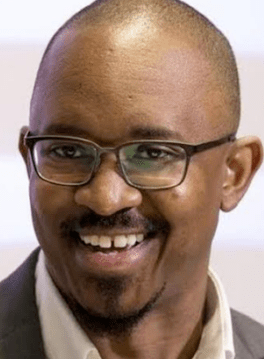 Joshua Johnson (pictured) will host an evening news analysis and explainer program. . . .”
Joshua Johnson (pictured) will host an evening news analysis and explainer program. . . .”
- “CNN disclosed the first details of its long-awaited new subscription streaming service Monday, which will launch in the first quarter of 2022 with 8-12 hours of original live content each day,” Andrew Wallenstein reported July 19 for Variety. CNN Worldwide chief digital officer Andrew Morse “revealed that CNN is looking to hire 450 people in the next 6-9 months to support CNN Plus, which he also said would be looking to experiment in programming formats that blur the line between news and entertainment. . . .”
- “The White House says it has struck a deal with House Democrats and Republicans on a massive infrastructure bill that includes $65 billion for broadband tied to speed, affordability and competition,” John Eggerton reported Thursday for nexttv.com. “The President signaled the bill will get consideration in the Senate and that the broadband investment will ensure that ‘every American has access to reliable, high-speed internet.’ . . .”
 “Channel 2 Action News anchor Jovita Moore (pictured) has an aggressive form of brain cancer, WSB-TV reported during its 4 p.m. newscast Thursday,” Rodney Ho reported for the Atlanta Journal-Constitution. “Moore ― who has been with WSB-TV since 1998 and has won numerous Emmy awards ― had brain surgery in April after doctors discovered tumors. At the time, doctors had hoped she could be back on air in eight to 10 weeks, assuming no serious complications. But pathologists discovered Moore had glioblastoma, a serious form of cancer. . . . The station said people can leave a note online on the WSB-TV website or send cards to Moore at the station address: 1601 W. Peachtree St. NE, Atlanta, Ga. 30309. She has also asked for concerned viewers to donate to two charities: Our House, a charity that addresses homelessness, and National Brain Tumor Society.”
“Channel 2 Action News anchor Jovita Moore (pictured) has an aggressive form of brain cancer, WSB-TV reported during its 4 p.m. newscast Thursday,” Rodney Ho reported for the Atlanta Journal-Constitution. “Moore ― who has been with WSB-TV since 1998 and has won numerous Emmy awards ― had brain surgery in April after doctors discovered tumors. At the time, doctors had hoped she could be back on air in eight to 10 weeks, assuming no serious complications. But pathologists discovered Moore had glioblastoma, a serious form of cancer. . . . The station said people can leave a note online on the WSB-TV website or send cards to Moore at the station address: 1601 W. Peachtree St. NE, Atlanta, Ga. 30309. She has also asked for concerned viewers to donate to two charities: Our House, a charity that addresses homelessness, and National Brain Tumor Society.”
 “Independent, nonprofit news media organization Futuro Media announced today founding support for the Futuro Unidad Hinojosa Investigative (FUHi) from Hispanics in Philanthropy, a transnational network of grantmakers committed to strengthening Latino communities across the Americas,” Futuro Media announced in June. The announcement was part of a larger story Tuesday about Futuro Media, founded by broadcaster Maria Hinojosa (pictured), from Hanaa’ Tameez of Nieman Lab. “It’s less about fancy tools and new platforms, and more about telling the stories that are long overdue to be told,” Tameez wrote. Marlon Bishop, Futuro vice president of content development, said, “The question, like, ‘Why does this story matter to the random white woman in Minnesota?’ That’s a question we never really asked at Futuro. It was always like, tell the story without the explanatory commas, as if you’re telling to the person you want to be telling the story to: your friends, your family, your community.”
“Independent, nonprofit news media organization Futuro Media announced today founding support for the Futuro Unidad Hinojosa Investigative (FUHi) from Hispanics in Philanthropy, a transnational network of grantmakers committed to strengthening Latino communities across the Americas,” Futuro Media announced in June. The announcement was part of a larger story Tuesday about Futuro Media, founded by broadcaster Maria Hinojosa (pictured), from Hanaa’ Tameez of Nieman Lab. “It’s less about fancy tools and new platforms, and more about telling the stories that are long overdue to be told,” Tameez wrote. Marlon Bishop, Futuro vice president of content development, said, “The question, like, ‘Why does this story matter to the random white woman in Minnesota?’ That’s a question we never really asked at Futuro. It was always like, tell the story without the explanatory commas, as if you’re telling to the person you want to be telling the story to: your friends, your family, your community.”
- “In January 2021, the Google News Initiative, in partnership with the Association of Alternative Newsmedia (AAN), the National Association of Hispanic Publications (NAHP), and the National Newspaper Publishers Association (NNPA), kicked off the GNI Ad Transformation Lab: A six-month program to help Black and Latino news publishers in the U.S. and Canada advance their advertising strategies and grow digital revenue,” Editor & Publisher explained Sunday. Twenty-eight organizations participated in the program. E&P posted a recording of a panel discussion about the collaboration.
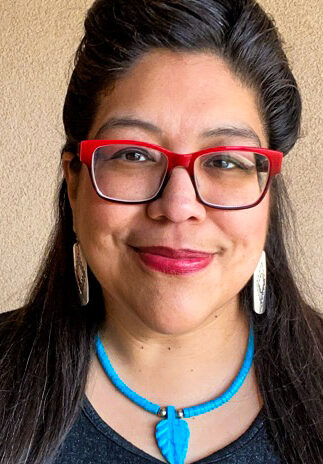 Tara Gatewood (pictured), longtime host of “Native America Calling,” is departing the show at the end of the week, Acee Agoyo reported Tuesday for indianz.com. “The show airs live every weekday at 1pm Eastern on nearly 70 public, community and tribal radio stations in the United States and in Canada.” Gatewood “is headed to the International Women’s Media Foundation, where she has served as a fellow. She will be leading up a new project that is focused on missing and murdered Indigenous women and girls, whose stories often go unheard and misreported in the mainstream media.” Koahnic Broadcast Corp., the owner of “Native America Calling,” will be launching a search for a new host.
Tara Gatewood (pictured), longtime host of “Native America Calling,” is departing the show at the end of the week, Acee Agoyo reported Tuesday for indianz.com. “The show airs live every weekday at 1pm Eastern on nearly 70 public, community and tribal radio stations in the United States and in Canada.” Gatewood “is headed to the International Women’s Media Foundation, where she has served as a fellow. She will be leading up a new project that is focused on missing and murdered Indigenous women and girls, whose stories often go unheard and misreported in the mainstream media.” Koahnic Broadcast Corp., the owner of “Native America Calling,” will be launching a search for a new host.
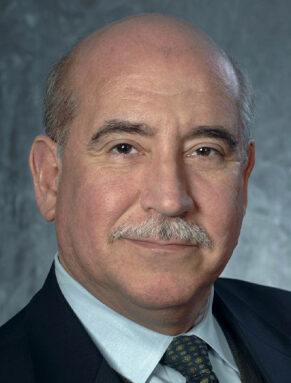 “Al Ortiz (pictured), a longtime veteran of CBS News, is returning to the CBS Evening News as interim executive producer, taking the place of Jay Shaylor, who stepped down from the Norah O’Donnell-anchored newscast earlier this month,” Ted Johnson reported Wednesday for Deadline.
“Al Ortiz (pictured), a longtime veteran of CBS News, is returning to the CBS Evening News as interim executive producer, taking the place of Jay Shaylor, who stepped down from the Norah O’Donnell-anchored newscast earlier this month,” Ted Johnson reported Wednesday for Deadline.
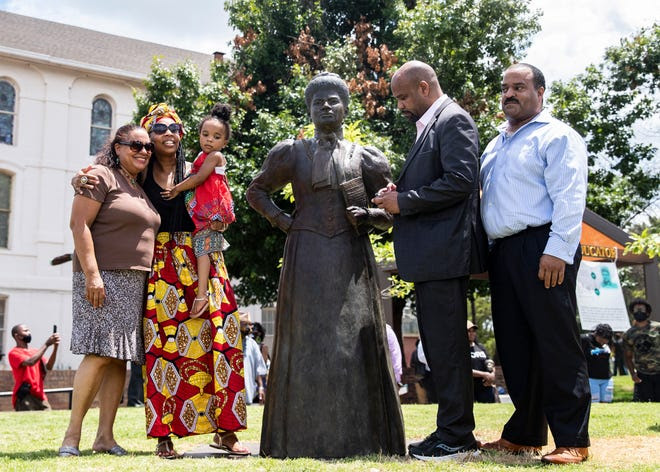
Memphis Commercial Appeal. “A life-size statue honoring the pioneering journalist, educator and civil rights advocate now stands at Beale and Fourth streets, adjacent to the original office of Wells’ The Free Speech and Headlight newspaper. The unveiling culminated a full week of festivities celebrating Wells’ life and legacy in Memphis. . . .”
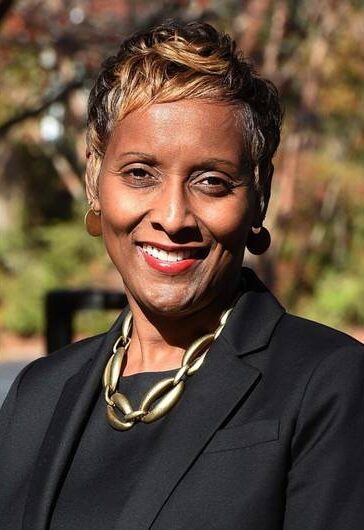 Monica Richardson (pictured), executive editor of the Miami Herald, was asked what advice she’d give today’s young journalists. She told the Poynter Institute’s Kristen Hare, “Make the most of every opportunity and always keep the mission of journalism in the forefront of everything you do. … Ask yourself, ‘Why am I doing this?’ Then use that as the guide for everything you do in your career. On a more personal note, something I always live by is to never let anyone or anything steal your joy. I became a journalist because making a difference brought me joy. I won’t let anyone or anything take that from me,” Hare reported Wednesday.
Monica Richardson (pictured), executive editor of the Miami Herald, was asked what advice she’d give today’s young journalists. She told the Poynter Institute’s Kristen Hare, “Make the most of every opportunity and always keep the mission of journalism in the forefront of everything you do. … Ask yourself, ‘Why am I doing this?’ Then use that as the guide for everything you do in your career. On a more personal note, something I always live by is to never let anyone or anything steal your joy. I became a journalist because making a difference brought me joy. I won’t let anyone or anything take that from me,” Hare reported Wednesday.
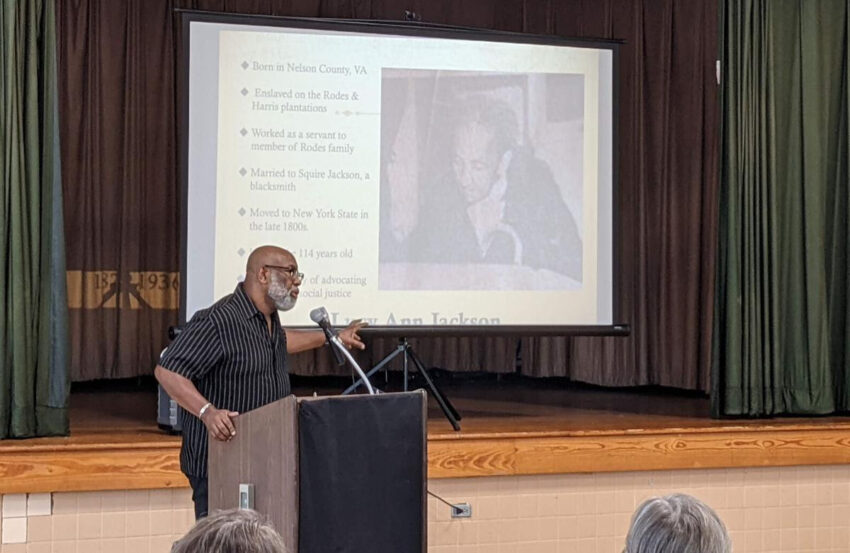
- “A hundred and fifty was a number that has been on Roger S. Glass’ mind as of late. It was roughly 150 years ago that his ancestors left Nelson County in the aftermath of the Civil War,” Nick Cropper wrote Wednesday for the News & Advance in Lynchburg, Va. “Glass on July 18 shared the story of his family’s legacy at the Nelson Heritage Center,” including that of Lucy Ann Jackson, “a former enslaved woman with ties to Nelson County who would go on to live to be older than 100 years old and claim the title of America’s oldest voter in 1936. She registered to vote that same year and was believed to be as old as 114.” Glass is a former president of the Washington Association of Black Journalists and Jackson’s great-great-grandson. He said Jackson has inspired her descendants.
- The American Journalism Project, a venture philanthropy organization committed to building a future for local news, announced grants to nonprofit news organizations that serve communities in Texas, West Virginia and Wisconsin,” the project announced Thursday. “ ‘El Paso Matters, Mountain State Spotlight, Wisconsin Watch and Milwaukee Neighborhood News Service are part of a new generation of organizations that is leading us to reimagine local news in service of communities,’ says Sarabeth Berman, CEO of American Journalism Project. . . .”
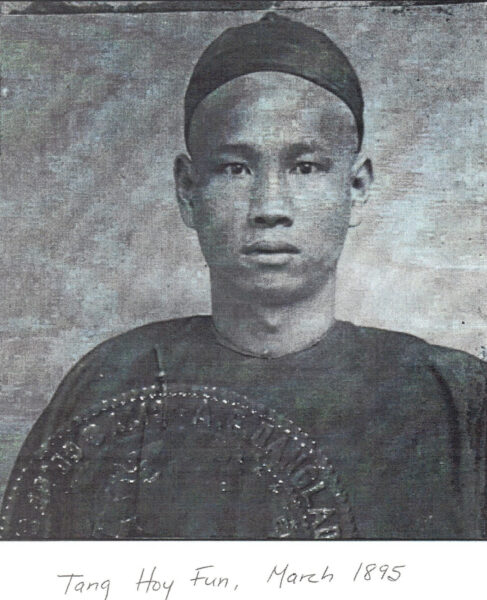
- Anh Do offered a history lesson Monday in the Los Angeles Times. “In the basement of Reign Salon in Antioch, a brick wall is a reminder of a dark past. More than a century ago, Chinese people built tunnels under the city because they were forbidden by law from going outside after sundown. Then, white residents burned Chinatown to the ground. . . . City Council has apologized to all early Chinese immigrants and their descendants and will create a Chinatown Historic District and fund murals and museum exhibits commemorating the city’s Asian history,” Do reported. “Antioch is one of many California cities, including Los Angeles and Santa Ana, where white residents lynched Chinese people or burned down their neighborhoods in the late 1800s and early 1900s. . . .”
 Manny Fernandez (pictured) will become deputy politics editor at The New York Times, working with newly named politics editor David Halbfinger, the Times announced Monday. “Manny spent nine years covering Texas as Houston bureau chief before moving to Los Angeles during the pandemic, where he has been guiding our California coverage as an editor and reporter. His time covering the political and cultural diversity of Texas gives him the background to help guide our coverage of politics and voters across the ideological spectrum. Manny will continue working from California,” the editors said.
Manny Fernandez (pictured) will become deputy politics editor at The New York Times, working with newly named politics editor David Halbfinger, the Times announced Monday. “Manny spent nine years covering Texas as Houston bureau chief before moving to Los Angeles during the pandemic, where he has been guiding our California coverage as an editor and reporter. His time covering the political and cultural diversity of Texas gives him the background to help guide our coverage of politics and voters across the ideological spectrum. Manny will continue working from California,” the editors said.
 Laura Moscoso (pictured), a data journalist at the Puerto Rico Center for Investigative Journalism (el Centro de Periodismo Investigativo), has been chosen for the Rising Star Award of the Reporters Committee for Freedom of the Press, the organization announced Tuesday. “She reported on the discrepancy between the death toll figures released by the government and the actual number of deaths caused by Hurricane María in 2017, among other investigations.” Awards will go to J. Scott Applewhite, senior photojournalist at the Associated Press; Theodore J. Boutrous, Jr., media law attorney and partner at Gibson, Dunn & Crutcher LLP; Julie K. Brown, investigative journalist for The Miami Herald; Amal Clooney, co-founder and president, Clooney Foundation for Justice, and Jane Mayer, staff writer and chief Washington correspondent for The New Yorker.
Laura Moscoso (pictured), a data journalist at the Puerto Rico Center for Investigative Journalism (el Centro de Periodismo Investigativo), has been chosen for the Rising Star Award of the Reporters Committee for Freedom of the Press, the organization announced Tuesday. “She reported on the discrepancy between the death toll figures released by the government and the actual number of deaths caused by Hurricane María in 2017, among other investigations.” Awards will go to J. Scott Applewhite, senior photojournalist at the Associated Press; Theodore J. Boutrous, Jr., media law attorney and partner at Gibson, Dunn & Crutcher LLP; Julie K. Brown, investigative journalist for The Miami Herald; Amal Clooney, co-founder and president, Clooney Foundation for Justice, and Jane Mayer, staff writer and chief Washington correspondent for The New Yorker.

- “It’s been just a year since Black Women Photographers was founded, on July 7, 2020, and the organization has already done so much to help Black and non-binary photographers,” Ibtasam Elmaliki wrote for kulturehub.com. “The organization was founded by Polly Irungu in order to give Black women photographers like herself not only the platform and attention they deserve but also the appreciation and pay. With 600 members from all around the world, big strides have been made to help the community. Just recently, BWP partnered with Nikon, receiving $40k in grants and $10k for gear. . . .”
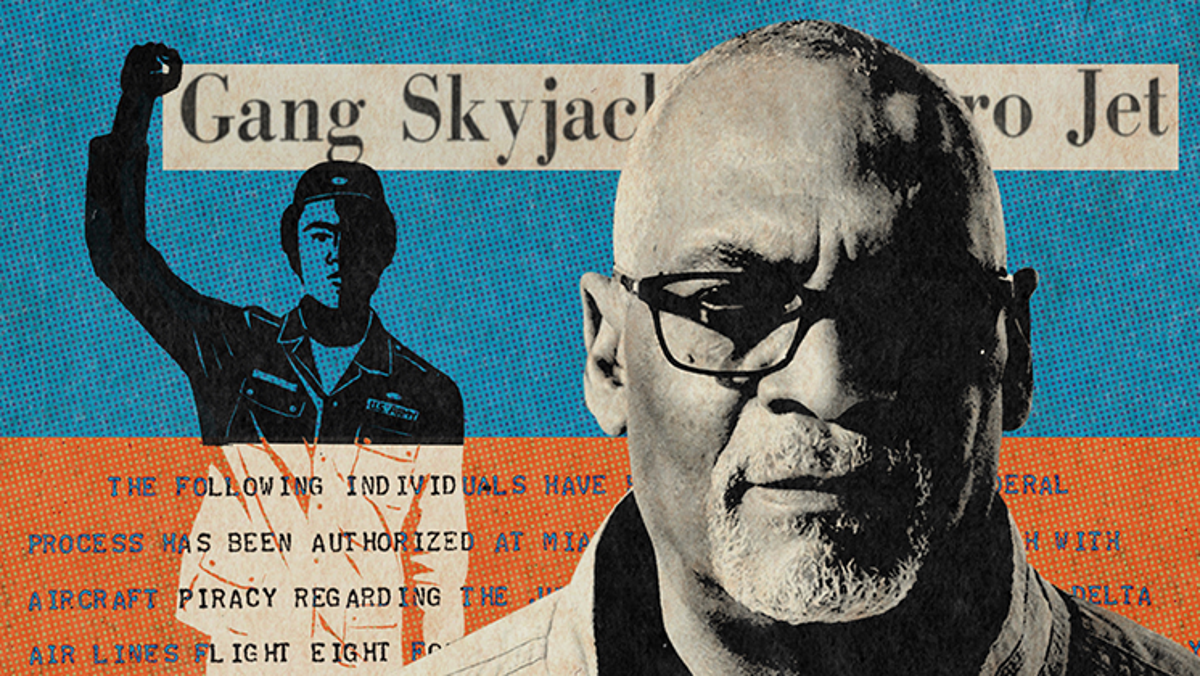 Next year marks 50 years since Melvin McNair (pictured), 72, hijacked a plane with his wife and three other Black Americans. “On July 31, 1972, they forced the Delta airliner, bound for Miami from Detroit, to divert to Algeria after demanding $1 million from the U.S. government. They wanted to connect with Eldridge Cleaver and other members of the Black Panther Party, the revolutionary-minded and controversial political organization that had established an international chapter in Algeria’s capital, Algiers,” Kim Hjelmgaard reported Thursday for USA Today. “For the first time, he is telling his story to a U.S. media outlet.” The story is part of a “Never Been Told” series, which “explores the unseen, unheard, lost and forgotten stories of America’s people of color.”
Next year marks 50 years since Melvin McNair (pictured), 72, hijacked a plane with his wife and three other Black Americans. “On July 31, 1972, they forced the Delta airliner, bound for Miami from Detroit, to divert to Algeria after demanding $1 million from the U.S. government. They wanted to connect with Eldridge Cleaver and other members of the Black Panther Party, the revolutionary-minded and controversial political organization that had established an international chapter in Algeria’s capital, Algiers,” Kim Hjelmgaard reported Thursday for USA Today. “For the first time, he is telling his story to a U.S. media outlet.” The story is part of a “Never Been Told” series, which “explores the unseen, unheard, lost and forgotten stories of America’s people of color.”
- “Efforts by the governments and conflicts have become a major obstacle in reporting on COVID-19 pandemic in Africa,” Ronja Koskinen reported Thursday for the International Press Institute. “Journalists are struggling to get accurate information from their governments, which are attempting to control the public narrative about the unprecedented health crisis, according to panelists who participated in a webinar jointly organized by the International Press Institute (IPI) a global network of editors, media executives and journalists, and the Economic, Social and Cultural Commission of the African Union (AU-ECOSOCC) on July 15 to raise awareness about the challenges faced by journalists in covering the health crisis in Africa.” The discussion was moderated by John Yearwood, global news editor of Politico and member of IPI’s executive board.
- “The about-face Conservative talker Phil Valentine has made on the COVID-19 vaccine has a lot of our readers questioning the role talk radio has been playing – some say preventing – in rolling the vaccine out,” Ed Ryan, editor of Radio Ink Magazine, wrote Tuesday under the headline, “Is Talk Radio Killing People?” “Valentine had been a vaccine skeptic until July 11th when he tested positive for the virus. He eventually got COVID related pneumonia and became seriously ill. Valentine, through his family, has said he wished he was more of a proponent of the vaccine and he’ll be talking about his situation more when he returns to the airwaves. . . . “
- “Meghan Markle and Prince Harry are bringing attention to issues they believe in by supporting those who stand up to injustice and calling out the “underrepresentation, inequity and racial bigotry” that exist in the media,” Carly Ledbetter reported Tuesday for HuffPost. “In a post published on their Archewell foundation website last week, the Duke and Duchess of Sussex expressed their public support for journalists looking to hold the Society of Editors (SoE) in the United Kingdom accountable, months after the organization claimed that the U.K. media is ‘most certainly not racist.’ The SoE is a group of about 400 senior members of the media in the U.K. . . .”
 ” ‘I am not free, but at least I am out of the dungeons,’ Camila Acosta (pictured) told CPJ via messaging app after her release to house arrest on July 16 following a four-day detention for covering the recent protests in Cuba,” Ana Cristina Núñez reported Monday for the Committee to Protect Journalists. “Acosta, who is based in Havana, covered protests on July 11 for the Cuban independent digital outlet Cubanet on Facebook Live and for the Spanish daily ABC. The following day, she was detained by officers of the National Revolutionary Police (PNR) and sent to the 4th Station of the PNR, in Havana. At least other 10 journalists have been detained in the aftermath of the protests, and today at least one remains behind bars, CPJ has confirmed with sources on the ground. . . .”
” ‘I am not free, but at least I am out of the dungeons,’ Camila Acosta (pictured) told CPJ via messaging app after her release to house arrest on July 16 following a four-day detention for covering the recent protests in Cuba,” Ana Cristina Núñez reported Monday for the Committee to Protect Journalists. “Acosta, who is based in Havana, covered protests on July 11 for the Cuban independent digital outlet Cubanet on Facebook Live and for the Spanish daily ABC. The following day, she was detained by officers of the National Revolutionary Police (PNR) and sent to the 4th Station of the PNR, in Havana. At least other 10 journalists have been detained in the aftermath of the protests, and today at least one remains behind bars, CPJ has confirmed with sources on the ground. . . .”
- “Over the last several days, a group of volunteers and activists created a website to register the number and identities of those who they say have gone missing in Cuba since the July 11 anti-government protests,” Juanita Ramos Ardila reported Wednesday for Latino Rebels. “According to the new Cuba Missing project, organizers said that they have registered 704 cases. As of the publication of this story, Cuba Missing’s 704 cases include 37 people who are confirmed missing, 163 people who have been released, 266 people who have been arrested and 238 people whose whereabouts are unknown. . . .”
- In Brazil, Black Adnet aims to connect major brands with collectives and media outlets, with the goal of helping to sustain and strengthen independent journalism. “Initially, the members of the network were mostly Black media sites, specialized in covering racial issues. Over time, the network expanded the spectrum of participants, including outlets focused on peripheral audiences, on issues of gender and LGBTQIA+ communities or on the defense of human rights,” Marina Estarque wrote July 21 for LatAm Journalism Review.
To subscribe at no cost, please send an email to journal-isms+subscribe@groups.io and say who you are.
Facebook users: “Like” “Richard Prince’s Journal-isms” on Facebook.
Follow Richard Prince on Twitter @princeeditor
Richard Prince’s Journal-isms originates from Washington. It began in print before most of us knew what the internet was, and it would like to be referred to as a “column.” Any views expressed in the column are those of the person or organization quoted and not those of any other entity. Send tips, comments and concerns to Richard Prince at journal-isms+owner@
View previous columns (after Feb. 13, 2016).
View previous columns (before Feb. 13, 2016)
- Diversity’s Greatest Hits, 2018 (Jan. 4, 2019)
- Book Notes: Is Taking a Knee Really All That? (Dec. 20, 2018)
- Book Notes: Challenging ’45’ and Proudly Telling the Story (Dec. 18, 2018)
- Book Notes: Get Down With the Legends! (Dec. 11, 2018)
- Journalist Richard Prince w/Joe Madison (Sirius XM, April 18, 2018) (podcast)
- Richard Prince (journalist) (Wikipedia entry)
- February 2018 Podcast: Richard “Dick” Prince on the need for newsroom diversity (Gabriel Greschler, Student Press Law Center, Feb. 26, 2018)
- Diversity’s Greatest Hits, 2017 — Where Will They Take Us in the Year Ahead?
- Book Notes: Best Sellers, Uncovered Treasures, Overlooked History (Dec. 19, 2017)
- An advocate for diversity in the media is still pressing for representation, (Courtland Milloy, Washington Post, Nov. 28, 2017)
- Morgan Global Journalism Review: Journal-isms Journeys On (Aug. 31, 2017)
- Diversity’s Greatest Hits, 2016
- Book Notes: 16 Writers Dish About ‘Chelle,’ the First Lady
- Book Notes: From Coretta to Barack, and in Search of the Godfather
- Journal-isms’ Richard Prince Wants Your Ideas (FishbowlDC, Feb. 26, 2016)
- “JOURNAL-ISMS” IS LATEST TO BEAR BRUNT OF INDUSTRY’S ECONOMIC WOES (Feb. 19, 2016)
- Richard Prince with Charlayne Hunter-Gault,“PBS NewsHour,” “What stagnant diversity means for America’s newsrooms” (Dec. 15, 2015)
- Book Notes: Journalists Follow Their Passions
- Book Notes: Journalists Who Rocked Their World
- Book Notes: Hands Up! Read This!
- Book Notes: New Cosby Bio Looks Like a Best-Seller
- Journo-diversity advocate turns attention to Ezra Klein project (Erik Wemple, Washington Post, March 5, 2014)
When you shop @AmazonSmile, Amazon will make a donation to Journal-Isms Inc. https://t.co/OFkE3Gu0eK
— Richard Prince (@princeeditor) March 16, 2018
